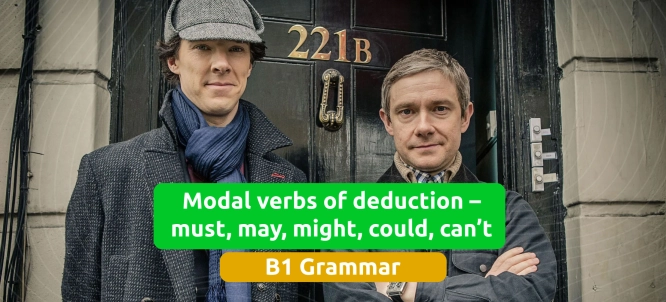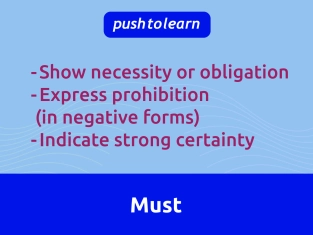by PushtoLearn
Modal Verbs of Deduction – must, may, might, could, can’t
Table of Contents
Modal Verbs of Deduction Exercises
These exercises focus on Modal Verbs of Deduction
What Are Modal Verbs of Deduction?
Modal verbs of deduction help us express certainty or possibility about something in the present, past, or future.
Key Modal Verbs for Deduction:
-
Must: Strong certainty.
-
May / Might / Could: Possibility, less certain.
-
Can’t: Strong certainty that something is impossible.

Using Modal Verbs of Deduction in the Present
Structure:
|
Subject |
Modal Verb |
Base Verb |
Object |
|
She |
must |
be |
tired. |
How to Use Them:
|
Modal Verb |
Level of Certainty |
Example |
|
Must |
Strong certainty (positive) |
She must be tired. (I’m sure she’s tired.) |
|
May |
Possibility |
He may be busy. (It’s possible he’s busy.) |
|
Might |
Possibility |
They might know the answer. |
|
Could |
Possibility |
This could be the solution. |
|
Can’t |
Strong certainty (negative) |
He can’t be at home. (I’m sure he’s not.) |
Examples in Context:
-
The lights are off. He must be out.
-
It’s cloudy. It might rain later.
-
That answer can’t be right—it doesn’t make sense.
Using Modal Verbs of Deduction in the Past
Structure:
|
Subject |
Modal Verb |
"Have" |
Past Participle |
|
She |
must |
have |
forgotten |
How to Use Them:
|
Modal Verb |
Level of Certainty |
Example |
|
Must have |
Strong certainty (positive) |
He must have left early. (I’m sure he left early.) |
|
May have |
Possibility |
She may have forgotten the meeting. |
|
Might have |
Possibility |
They might have taken the wrong train. |
|
Could have |
Possibility |
You could have missed the call. |
|
Can’t have |
Strong certainty (negative) |
She can’t have finished already! (I’m sure she didn’t.) |
Examples in Context:
-
He didn’t answer his phone. He must have been asleep.
-
They might have gotten lost on the way.
-
She can’t have written this—it doesn’t look like her handwriting.
Common Errors and How to Avoid Them
|
Mistake |
Correct Example |
Explanation |
|
Using "must" for impossibility |
He must be home. → He can’t be home. |
Use "can’t" for strong certainty about something not being true. |
|
Using "might" for certainty |
They might be late. → They must be late. |
Use "must" for strong certainty. |
|
Forgetting "have" in past deductions |
She might missed it. → She might have missed it. |
For past deductions, use "have" + Past Participle. |
Everyday Examples
-
Present Deduction:
-
It’s so quiet. The kids must be asleep.
-
He can’t be at work; it’s his day off.
-
Past Deduction:
-
The door is locked. They must have left already.
-
He might have forgotten to bring his wallet.
-
Future Deduction:
-
She might be late if the traffic is bad.
-
This could be the answer we’re looking for.
To learn more about Modal Verbs including Past Modal Verbs, have a look at these lessons: Modal verbs of Prohibition, Modal verbs of Permission, Modal verbs of Necessity.
FAQ
What is the difference between "must" and "can’t"?
-
Must: Strong certainty something is true.
She must be tired (I’m sure she is tired). -
Can’t: Strong certainty something is impossible.
She can’t be tired (I’m sure she isn’t tired).
Can I use "might" and "could" interchangeably?
Yes, they both express possibility, but "might" is more common in casual English:
-
She might be home. = She could be home.
How do I use modal verbs for deductions in the past?
Use "modal verb + have + past participle":
-
He must have left early.
Is "may" stronger than "might"?
Not really. Both express possibility, but "might" is slightly more informal.
Can "must" express obligation and deduction?
Yes, "must" has two meanings:
-
Obligation: You must wear a helmet.
-
Deduction: He must be the new teacher.

